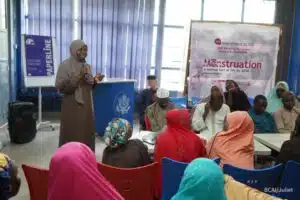Bridge Connect Africa Initiative (BCAI) a youth-led civil society organization partnered with Kanawa Educational Foundation for the Disabled (KEFD) to commemorate the World’s Menstrual Hygiene Day at the America Conner of Kano State Library, Kano state on the 30th May 2022.
The workshop was put together to educate and sensitize People With Disabilities (PWD) on menstrual hygiene, period poverty, menstrual stigmatization, and myths around menstruation.
Some of the project team members in persons of Juliet Nwobodo and Favour Ogbuagu trained the participants on the theme for the year “Making menstruation a normal fact of life by 2030”.
During the workshop, Fatima Musa Aliyu, BCAI Acting Executive Director, intimated the participants about BCAI, and what they do- promotion of sexual reproductive health, and some projects the organization has carried out to promote menstrual hygiene – The Aurbun girls’ project.

In her welcome remark, she reiterated the need for people and organisations to collaborate towards ending period poverty.
Global health recorded achievements inspite of COVID-19, says WHO
In her words, “it is not all up to the government to end period poverty, while we want the government to urgently address this, there is a need for people to commit and collaborate towards ending period poverty “.
On why there were men in the gathering, she stated that it was important for more men to be aware of the issues surrounding menstruation and lack of access to sanitary materials so that they can help support women within their various capacities to end period poverty.
While addressing the media, she called on the government, organizations and the general public to create a safe environment for women and girls during menstruation.
She further called for the government and public institutions to provide sanitary banks as well as WASH facilities in public places for women in case of emergencies.
Fatima urges the government to regulate the prices and taxes of sanitary pads in order to make it affordable and accessible to all.
Hussaina Lami Umar, one of the participants from the PWD community, thanked BCAI for being socially inclusive in their program, and encouraged the other CSOs to adopt programs design as this in order to carry everyone along in the society.
At the end of the workshop, some of the male participants made commitments to always support women and girls during their period and to lend their voices to the advocacy for affordable sanitary materials.


